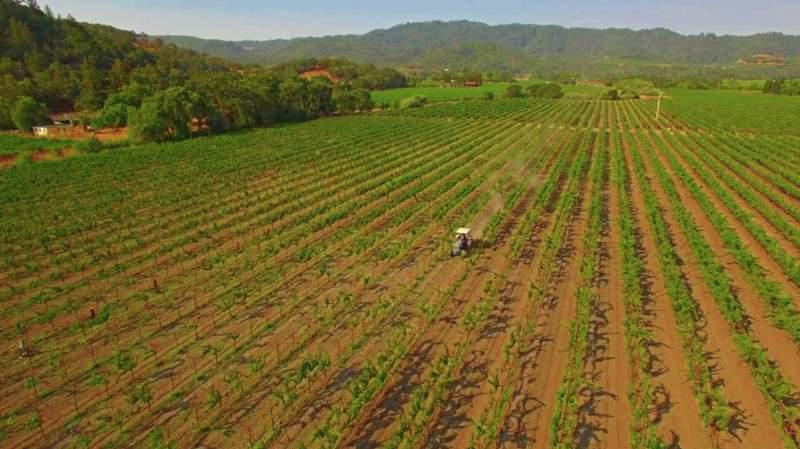One of Napa’s most contentious laws could come under the microscope after a successful Michigan lawsuit.
W. Blake Gray | Wine-Searcher |
The modern history of Napa County revolves around its agricultural preserve law, which local voters approved in 1968. It’s intended to restrict development, preserving the land for vineyards, and it has given the county government wide latitude to regulate every aspect of wineries.
Today this landmark law suddenly looks vulnerable to a federal court challenge, thanks to a ruling last week in a lawsuit by several wineries in Michigan against their local government.
A group of 11 wineries on the Old Mission Peninsula won $50 million in damages by suing Peninsula Township over its restrictive zoning laws, many of which are very similar to Napa County‘s. The wineries got this money even though the township, realizing it was not going to win the lawsuit, repealed its zoning laws in 2022.
Now the same law firm that represented the Michigan wineries is representing three Napa Valley wineries – Smith-Madrone Vineyards & Winery, Summit Lake Vineyards and Hoopes Vineyard – in a similar federal lawsuit against Napa County. The case is on hold right now while a different case filed against Hoopes Vineyard makes its way through the appeals process.
But the federal court will eventually get to the Napa County case. Napa leaders should read the Michigan case to see what they’re up against. I’m not a lawyer, but some of the arguments look exactly the same to me.
A big similarity is this: US District Judge Paul L. Maloney wrote repeatedly that while the township claimed its regulations were designed to protect agriculture, in fact, they made business more difficult for each of the 11 wineries that sued.
“Perhaps the easiest way to support agriculture on the OMP [Old Mission Peninsula] would be to support the farms there, and the [zoning law] does not do that,” Maloney wrote.
This is exactly the argument Napa County wineries have been making for years: restricting their rights to serve food, sell merchandise, receive visitors and host weddings hurts their business, which is fundamentally agriculture.
Another rule the OMP had was that wineries on the Peninsula must use at least 85 percent grapes grown on the Peninsula for their total production – regardless of how they were labeled. In other words, they couldn’t buy grapes from, say, the Lake Michigan Shore AVA (or California, for that matter) to make more wines.
Napa County has exactly the same rule, requiring Napa wineries to use at least 75 percent local grapes; in other words, they can get in trouble for buying too many grapes from neighboring Sonoma County, even if the wines are properly labeled as being from Sonoma County. In 2013, Caymus Vineyards agreed to a $1 million settlement with the county for bottling more wine in Napa than its permit allowed.
“If a judge ever looks at this rule, it’s going to be struck down, It’s unconstitutional,” said Joe Infante, the Michigan-based lawyer for both the Michigan wineries and the three renegade wineries in Napa. “It’s not an AVA rule; it’s a labeling rule. The problem that the wineries in Michigan had is, there’s not enough grapes in Michigan Township. There’s not enough grapes in Napa Valley either. Maybe there are this year because there’s a glut, but that’s a year-by-year thing.”
Michigan Township had rules restricting events and visitors, just like Napa County does, and the judge looked skeptically at them.
“One of the defenses in Michigan was, if we let them do this, it’s not an agricultural use, it’s a commercial use,” Infante said. “The court said more events does not convert the wineries. That’s an important idea that comes out of this case. These are agricultural uses. Having an event, having retail, these are agricultural uses because they relate to the making and selling of wine.”
This concept has been a flashpoint for argument in Napa County for decades. The county passed a Winery Definition Ordinance in 1989 to try to clarify exactly what types of marketing count as agriculture, and which don’t. Weddings – a big profit center for most wineries – remain forbidden in Napa County, as they were in Michigan Township.
Important precedent
I wondered if Napa voters’ approval of the agricultural preserve would protect the county’s zoning from a court challenge. Infante told me it would not, citing an important Supreme Court precedent, Yick Wo v Hopkins.
In that case, decided in 1886, Yick Wo was a Chinese laundry in San Francisco, which was extremely racist against Chinese people at the time. (In 1877 there was a three-day riot in the city in which mobs attacked Chinatown, killing four, setting fires and destroying property.) San Francisco passed a law making laundries built of wood illegal; they were considered a fire hazard. But the effect of the law was to put Chinese laundries out of business.
“The court said, it doesn’t matter how popular an ordinance is, or if people voted for it, unconstitutional is unconstitutional,” Infante said. “Look at the civil rights cases in the 1950s. Those statutes were all popular. They were struck down. Just because something is popular or people voted on it, doesn’t really matter. In Michigan they had a development rights purchase plan. The defense was: ‘The people voted for this. You can’t challenge that.’ Of course you can.”
Infante called the Michigan decision a roadmap for wineries around the country to challenge local ordinances. Few counties anywhere regulate their wineries as strictly as Napa.
Stu Smith is one of the owners of Smith-Madrone. I have known Stu for a long time; he’s a land-rights advocate who often complains about the county, both because of the strictness of its regulations and the uneven way in which they are applied.
But Stu is also a big advocate for local viticulture and the environment. As one of the plaintiffs in the federal lawsuit against the county, he could hold the key to whether the agricultural preserve law survives or not. It seems to me that overall, the ag preserve has been good for Napa. So I called Stu to ask, what exactly do you want to achieve in court?
“The goal is a level playing field within California, which we don’t have,” Smith said. “We want a county government that makes clean, precise, understandable regulations, not one that changes the goal posts all the time. Or that tells us one thing and ends up doing something else. Most other counties don’t have restrictions on visitors.
“We’re a competitive industry. It’s getting more competitive all the time. We just want to be able to compete like any other wine region in California or the United States. We want to be able to host a few weddings a year. There’s nothing wrong with that. They’re marketing events. They’ll see what a beautiful area it is, and maybe we’ll make customers out of them. But it’s prohibited.”
Smith said something that echoed what the judge said in the Michigan case: restrictions meant to help agriculture are hurting companies that practice agriculture.
“[Wineries are] the goose that laid the golden egg,” Smith said. “You would think that they would want to support us. There’s a certain number of people who come to Napa County to visit wineries. Why shouldn’t they have the freedom to go wherever they want? Why should they be funneled to only the big wineries? They shouldn’t be able to go to only the wineries that can have 200 people a day, and not the people allowed only 5 people a day.”
Andy Beckstoffer, owner of the most and arguably best-regarded vineyards in Napa County, said that he believes the ag preserve law, and the 75 percent grape-use rule, have been instrumental in making Napa wines the worldwide success that they are today.
“You can’t preserve your agricultural preserve if you have no market for your grapes,” Beckstoffer said. “If Napa wineries can make anything and everything, the Napa Valley brand is at risk. I think people would go down on their sword on this one.”
They might have to. Infante said he expects to be spending a lot more time in Napa County soon as the Hoopes state-court case winds down, and he is confident a California judge will look at the Michigan decision and see the similarities.
Traffic is a huge political issue in Napa County and local people not in the wine industry will not be happy about an attorney who is basically trying to overturn limits on visits. But Infante is used to it.
“I was at a town board meeting (in Peninsula Township) at one point early on and someone keyed my car,” Infante said. “I’ve gotten yelled at up there. I’ve gotten booed. Someone called me the Death Star Lawyer. I guess I’m the destroyer of worlds.
“I’m not really worried about them keying my car in Napa,” Infante said. “It’ll be a rental. I’ll get the rental insurance.”


